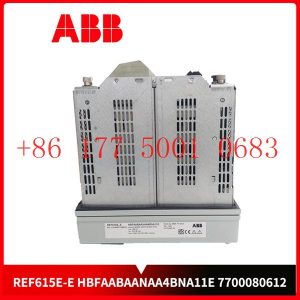Description
hardware flow control. It is an ideal choice in the field of industrial automation.
Why is the industrial Internet inseparable from industrial control?
ABB Global CEO Ulrich Spiesshofer recently accepted an exclusive interview with a reporter from Caijing in New York. He believes that the global manufacturing industry is
undergoing drastic changes. The era of labor arbitrage is over. Labor costs are no longer the focus of competition. The future of manufacturing lies in In factories that are smaller,
closer to consumers, and more agile. Artificial intelligence ( AI ) is the most important technology shaping the future of manufacturing. Currently, AI technology is mainly used in the
consumer field, but its large-scale application in the industrial field and among enterprises is more critical.
Digital transformation has been a keyword for global manufacturing giants in the past two years, and the industrial Internet is the implementation form of digital transformation.
General Electric (GE), Siemens and ABB are all leaders in this regard . Spiesshofer believes that GE”s industrial Internet only collects data and analyzes but cannot control it.
As the world”s two largest industrial automation suppliers, ABB and Siemens have the ability to control equipment, which is a significant difference from GE.
ABB is headquartered in Zurich, Switzerland. Its history can be traced back to the 1880s. It started from the original electrical manufacturing business and has developed into an international manufacturing
giant including electrical products, robotics and motion control, industrial automation and power grid. In 2017, ABB”s revenue was US$34.3 billion, ranking 341st among the
Fortune 500 companies. Spiesshofer has served as CEO for nearly five years since taking office in September 2013.
Below are the details of the interview.
The era of labor arbitrage is over
Caijing: Is 2018 a good year for the manufacturing industry?
Spiesshofer: From a global perspective, GDP is growing and consumption is also growing. Overall positive.
Caijing: What crucial changes are taking place in the manufacturing industry?
Spiesshofer: The jobs of the future will be different from the jobs of the past. In the Middle Ages, craftsmen moved between villages, taking their tools with them to work where
there was demand; later we invented factories, integrated supply and demand, and invented logistics; later people realized that there was labor arbitrage (Labor Arbitrage, Refers to
the existence of moving industries that have lost technological advantages and technical barriers to areas with low labor prices to increase profits by reducing labor costs), so we place
factories in emerging countries to benefit from labor arbitrage.
Now, with the development of modern automation and robotics, we can break this picture and bring value addition closer to demand. I think the future of manufacturing is
in factories that are smaller, closer to consumers, and more agile. I believe that the global logistics chain will also be reduced in the future because we will produce products closer to consumers.
The era of labor arbitrage shaping the global manufacturing landscape will be over because we can offset this arbitrage.
Recently we opened a new factory in Germany. Due to the adoption of intelligent automation technology, its unit cost is exactly the same as that of the best factories in
China. So I think the local market will be repositioned in the future, and the positioning of competitiveness will also change from just considering costs to focusing more on technology and value.
Caijing: Many people are complaining that automation has caused people to lose their jobs, and artificial intelligence technology has made the complaints louder
. But these new technologies are also creating new jobs. How do you see the relationship between the two?
Spiesshofer: In 1990, one-third of the world”s population lived below the extreme poverty line. Today, only 8% rely on technology. In fact, countries with the
highest robot densities, such as Germany, South Korea, Singapore, and Japan, also have the lowest unemployment rates. Robots combined with educated people can create prosperity, produce more
affordable goods, and lead to economic growth. Government, education and business need to work together to keep up with the changing world.
Clearly, millions of jobs are disappearing, but millions of new ones are being created. Taking our own business as an example, we used to have many
employees doing metal casting and forging work, but now these tasks are automated. But now we have more employees working in the service industry, developing apps, and working with customers.
So I think we should not be afraid of change, but should lead our employees to manage change and promote change. If we succeed, global employment will eventually grow.
Control module DCS system spare parts TK812V015
Control module DCS system spare parts TK812V015
Control module DCS system spare parts TK811V150
Control module DCS system spare parts TK811V150
Control module DCS system spare parts TK811V050
Control module DCS system spare parts TK811V050
Control module DCS system spare parts TK811V015
Control module DCS system spare parts TK811V015
Control module DCS system spare parts TK811F
Control module DCS system spare parts TK811F
Control module DCS system spare parts TK809F
Control module DCS system spare parts TK809F
Control module DCS system spare parts TK808F
Control module DCS system spare parts TK807F
Control module DCS system spare parts TK807F
Control module DCS system spare parts TK803V018 3BSC950130R1
Control module DCS system spare parts TK802F
Control module DCS system spare parts TK802F
Control module DCS system spare parts TK801V012
Control module DCS system spare parts TK801V012
Control module DCS system spare parts TK801V006
Control module DCS system spare parts TK801V006
Control module DCS system spare parts TK801V003/3BSC950089R1
Control module DCS system spare parts TK801V003
Control module DCS system spare parts TK801V003
Control module DCS system spare parts TK701F
Control module DCS system spare parts TK527V030
Control module DCS system spare parts TK516 3BSE000388R1
Control module DCS system spare parts TK516
Control module DCS system spare parts TK212A
Control module DCS system spare parts TK212A
Control module DCS system spare parts TK212
Control module DCS system spare parts TK212
Control module DCS system spare parts TD951F
Control module DCS system spare parts TC630
Control module DCS system spare parts TC625
Control module DCS system spare parts TC562
Control module DCS system spare parts TC560V2 3BSE022178R1
Control module DCS system spare parts TC520 3BSE001449R1
Control module DCS system spare parts TC514
Control module DCS system spare parts TC512V1 3BSE018059R1
Control module DCS system spare parts TC512V1
Control module DCS system spare parts TC512
Control module DCS system spare parts TC405K03
Control module DCS system spare parts TBU810
Control module DCS system spare parts TB870F
Control module DCS system spare parts TB870F
Control module DCS system spare parts TB852
Control module DCS system spare parts TB852
Control module DCS system spare parts TB850 3BSC950193R1
Control module DCS system spare parts TB850
Control module DCS system spare parts TB850
Control module DCS system spare parts TB845
Control module DCS system spare parts TB842
Control module DCS system spare parts TB840A 3BSE037760R1
Control module DCS system spare parts TB840A
Control module DCS system spare parts TB840
Control module DCS system spare parts TB826 3BSE061637R1
Control module DCS system spare parts TB825
Control module DCS system spare parts TB820V2
Control module DCS system spare parts TB820
Control module DCS system spare parts TB815
Control module DCS system spare parts TB811
Control module DCS system spare parts TB810
Control module DCS system spare parts TB807









Reviews
There are no reviews yet.